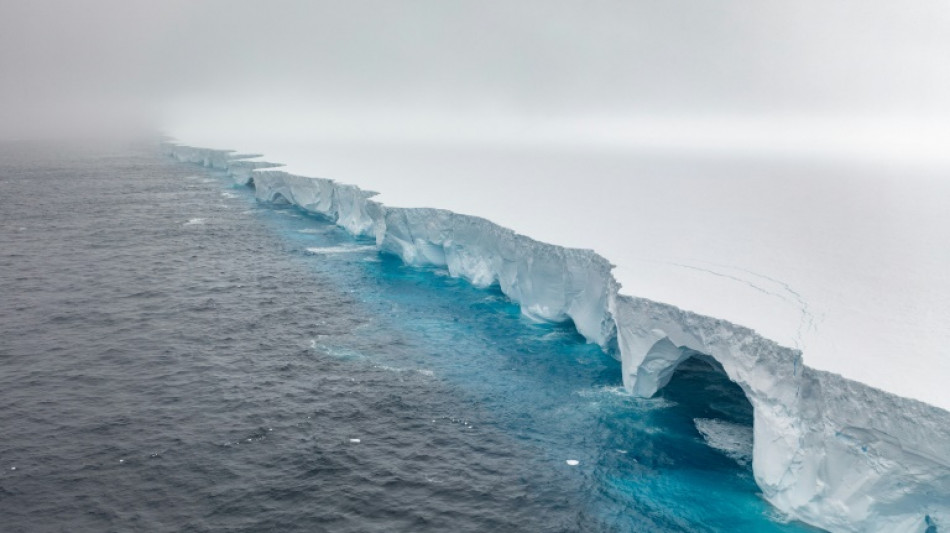
-
 Trump vows 10% global tariff after stinging court rebuke
Trump vows 10% global tariff after stinging court rebuke
-
Aston Martin in disarray as Leclerc tops F1 testing timesheets

-
 Venus Williams accepts Indian Wells wild card
Venus Williams accepts Indian Wells wild card
-
Anxious Venezuelans seek clarity on new amnesty law

-
 Last-gasp Canada edge Finland to reach Olympic men's ice hockey final
Last-gasp Canada edge Finland to reach Olympic men's ice hockey final
-
Scotland captain Tuipulotu grateful for Wales boss Tandy's influence

-
 Zelensky says no 'family day' in rare personal interview to AFP
Zelensky says no 'family day' in rare personal interview to AFP
-
Zelensky tells AFP that Ukraine is not losing the war

-
 Sweden to play Switzerland in Olympic women's curling final
Sweden to play Switzerland in Olympic women's curling final
-
Counting the cost: Minnesota reels after anti-migrant 'occupation'

-
 UK police probe Andrew's protection as royals reel from ex-prince's arrest
UK police probe Andrew's protection as royals reel from ex-prince's arrest
-
Doris says Ireland must pile pressure on England rising star Pollock

-
 US military assets in the Middle East
US military assets in the Middle East
-
Neymar hints at possible retirement after World Cup

-
 Stocks rise after court ruling against US tariffs
Stocks rise after court ruling against US tariffs
-
Australia end dismal T20 World Cup by thrashing Oman

-
 Olympics chief says Milan-Cortina has set new path for Games
Olympics chief says Milan-Cortina has set new path for Games
-
Russian SVR spy agency took over Wagner 'influence' ops in Africa: report

-
 Pegula fights back to sink Anisimova and reach Dubai final
Pegula fights back to sink Anisimova and reach Dubai final
-
Trump administration denounces 'terrorism' in France after activist's killing

-
 Colombia's Medellin builds mega-prison inspired by El Salvador's CECOT
Colombia's Medellin builds mega-prison inspired by El Salvador's CECOT
-
German broadcaster recalls correspondent over AI-generated images

-
 US Supreme Court strikes down swath of Trump global tariffs
US Supreme Court strikes down swath of Trump global tariffs
-
England's Itoje says managing 'emotional turmoil' key to 100 cap landmark

-
 Trump says weighing strike on Iran as Tehran says draft deal coming soon
Trump says weighing strike on Iran as Tehran says draft deal coming soon
-
Tudor is '100 percent' certain of saving Spurs from relegation

-
 Azam dropped for scoring too slowly, says Pakistan coach Hesson
Azam dropped for scoring too slowly, says Pakistan coach Hesson
-
Stocks volatile after soft US growth data, court ruling against tariffs

-
 Italy bring back Capuozzo for France Six Nations trip
Italy bring back Capuozzo for France Six Nations trip
-
From Malinin's collapse to Liu's triumph: Top Olympic figure skating moments

-
 Arteta urges Arsenal to 'write own destiny' after title wobble
Arteta urges Arsenal to 'write own destiny' after title wobble
-
Ukraine Paralympics team to boycott opening ceremony over Russian flag decision

-
 Wales captain Lake wants fans to bring 'noise' against Scotland
Wales captain Lake wants fans to bring 'noise' against Scotland
-
Skier Vonn's Italian hospital a hotbed of men, sister says

-
 India target S.Africa top order, Abhishek to come good: bowling coach
India target S.Africa top order, Abhishek to come good: bowling coach
-
Carrick praises Man Utd 'diversity' after Ratcliffe's immigrant rant

-
 I never thought it would be hit, says 'Scream' creator 30 years later
I never thought it would be hit, says 'Scream' creator 30 years later
-
AI summit statement delayed to 'maximise' signatories: India

-
 Barcelona's Sagrada Familia basilica hits peak height
Barcelona's Sagrada Familia basilica hits peak height
-
Milan sprints to second straight UAE stage win as Tiberi keeps lead

-
 US GDP growth misses expectations as Trump blames shutdown
US GDP growth misses expectations as Trump blames shutdown
-
Benfica investigate video of fans' monkey gestures

-
 French minister pledges tight security at rally for killed activist
French minister pledges tight security at rally for killed activist
-
Guardiola 'couldn't care less' about Arsenal stumble in title race

-
 UK police search property as royals reel from Andrew's arrest
UK police search property as royals reel from Andrew's arrest
-
Germany's Merz to visit China next week

-
 Kompany says Mourinho made 'huge mistake' in Vinicius racism row
Kompany says Mourinho made 'huge mistake' in Vinicius racism row
-
X appeals EU's 120-mn-euro fine over digital content violations

-
 Galthie recalls hulking locks Flament, Meafou for Italy
Galthie recalls hulking locks Flament, Meafou for Italy
-
Turkey, Saudi sign major solar power deal


World's biggest iceberg runs aground, sparing wildlife haven island
The world's biggest iceberg appears to have run aground roughly 70 kilometres from a remote Antarctic island, potentially sparing the crucial wildlife haven from being hit, a research organisation said Tuesday.
The colossal iceberg A23a -- which is more than twice the size of Greater London and weighs nearly one trillion tonnes -- has been drifting north from Antarctica towards South Georgia island since 2020.
This had raised fears it could collide with the island or run aground in shallower water near it, potentially disrupting the ability of penguins and seals to feed their young.
However, the gigantic wall of ice has been stuck 73 kilometres (45 miles) from the island since March 1, according to a statement from the British Antarctic Survey (BAS).
"If the iceberg stays grounded, we don't expect it to significantly affect the local wildlife," BAS oceanographer Andrew Meijers said.
"In the last few decades, the many icebergs that end up taking this route through the Southern Ocean soon break up, disperse and melt," added Meijers, who encountered A23a in late 2023 and has tracked its fate via satellite ever since.
Satellite images analysed by AFP showed that the closest edge of the iceberg had stopped more than 70 kilometres from the island in late February.
It remains unclear whether the iceberg is stuck for good.
"It will be interesting to see what will happen now," Meijers added.
- Potential upside for wildlife? -
The world's biggest and oldest iceberg calved from the Antarctic shelf in 1986.
It remained stuck for over 30 years before finally breaking free in 2020, its lumbering journey north sometimes delayed by ocean forces that kept it spinning in place.
Satellite imagery had previously suggested it was not crumbling into smaller chunks along the familiar path that such icebergs take. However a 19-kilometre chunk broke off in January.
There had been concerns for wildlife on the crucial breeding ground of South Georgia if the iceberg parked too close.
This would have forced animals like penguins and seals to travel much farther to get around the colossal block of ice.
"This could reduce the amount of food coming back to pups and chicks on the island, and so increase mortality," Meijers explained.
However in its current location, the iceberg could offer benefits to wildlife.
"Nutrients stirred up by the grounding (of the berg) and from its melt may boost food availability for the whole regional ecosystem, including for charismatic penguins and seals, Meijers said.
The seal and penguin populations on South Georgia had already had a "bad season" due to an outbreak of bird flu, Meijers told AFP in January.
- What about climate change? -
The iceberg poses no threat to shipping. It is so huge that vessels can easily avoid it.
However, as it breaks up into smaller pieces, certain areas could become off limits to commercial fishing ships "due to the number of smaller -- yet often more dangerous -- bergy bits", Meijers said.
There is no permanent human population on South Georgia, which the UK administers as a British overseas territory.
Argentina also claims the island -- along with the Falklands to the west.
Icebergs of this size are rare but not unheard of. There have been two of similar sizes in the same area over the last five years, Meijers said.
Such huge icebergs are a "completely normal part of the lifecycle" of the Antarctic ice sheets, Meijers emphasised.
But ice shelves have lost 6,000 billion tonnes of mass since 2000, which is matched by accelerating ice loss attributed to climate change, he added.
Researchers warned last month that a rise in the planet's average temperature to between 1.5 and 2.0 degrees Celsius above pre-industrial levels could melt enough frozen water to lift oceans by a dozen metres -- and beyond the point of no return.
Last year -- which smashed previous heat records as the world was battered by fires, floods and storms -- was the first calendar year above 1.5C.
Y.Aukaiv--AMWN


